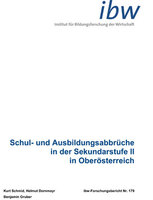Oberösterreich hat im Österreich- bzw. EU-Vergleich relativ günstige Werte betreffend die Integration der Jugendlichen in Ausbildungssystem und Arbeitsmarkt. Ausbildungsabbrüche/-wechsel, insbesondere jene am Ende der 9. Schulstufe, sind jedoch häufig. So bricht ein Drittel den zuerst eingeschlagenen Ausbildungsweg innerhalb der Sekundarstufe II vorzeitig ab. 5 Prozent eines Altersjahrgangs beginnen gar keine weiterführende Ausbildung auf Ebene der Sekundarstufe II. In Summe erreichen somit rund 15 Prozent eines Altersjahrgangs keinen Abschluss der Sekundarstufe II.
Warum wechseln so viele Jugendliche ihre Ausbildung? Wem gelingt dennoch ein erfolgreicher Sekundarstufe-II-Abschluss? Was bedeutet ein Wechsel/Abbruch für den Übergang in den Arbeitsmarkt? Wie hoch sind die Kosten „falscher“ Bildungswahl und nicht erfolgreicher Bildungslaufbahnen und wer trägt sie?
Bestellung der Print-Ausgabe für einen Druckkostenbeitrag von 17 Euro (inkl. allfälliger Versandspesen).
Compared with the whole of Austria (and within the EU), Upper Austria has relatively positive values regarding the integration of young people into the education system (and into the labour market). But dropouts and changes – particularly at the end of the 9th school year – are common in the education system: About one third prematurely leave the initially chosen Programme at the upper secondary level. 5% of each age group do not take up any programme at all at the upper secondary level. Overall, some 15% of each age group do not acquire any upper secondary qualification.
Why do so many youths change their educational career? Which people nevertheless successfully obtain an upper secondary qualification? What does a change or dropout mean for their transition to the labour market? How high are the costs of a “wrong” educational career decision and unsuccessful educational careers and who pays these costs?
